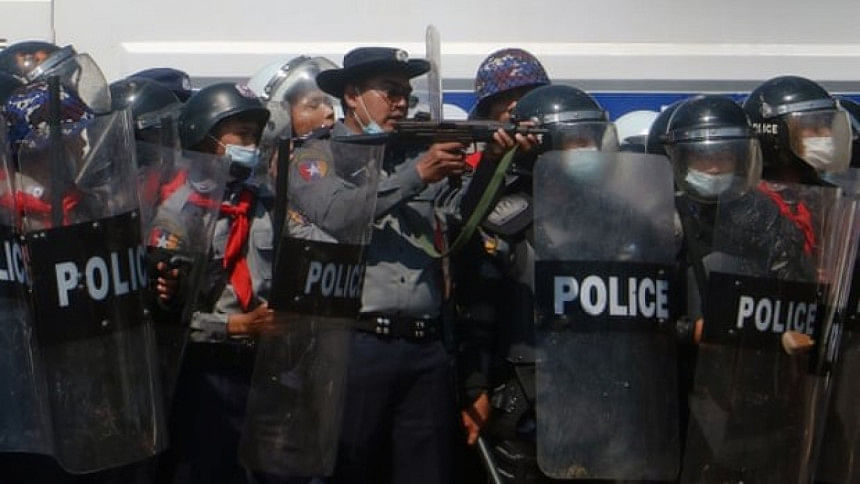EU training to Myanmar police on crowd control: what message does it send?

According to a report by The Guardian published on February 11, the European Union had equipped Myanmar Police with special training on crowd control, a technique that is now being employed to silence voices protesting against the military which staged a coup to oust the Suu Kyi-led party that was set to form the government for the second term in a row.
Posing as the protector of democracy, the Myanmar military accused Suu Kyi's party of vote-rigging and irregularities. However, a big question remains on what stepping stones they laid to protect democracy.
The most crucial measure they adopted is leaving out the faintest scope for anyone to organise any gathering or procession. They robbed newspapers of the right to pen a single word against the military junta or in favour of the ousted elected government. Is this the way they epitomise democracy?
One may draw a parallel between this hush in Myanmar with that in the aftermath of the assassination of Bangabandhu Sheikh Mujibur Rahman, Bangladesh's Father of the Nation, on August 15 in 1975.
Bangabandhu had called for the second revolution by forming a novel political front, Bangladesh Krishak Sramik Awami League (BaKSAL), with an overarching goal of attaining economic self-sufficiency, eliminating corruption, and conducting administrative decentralisation, leading to criticisms from some people who termed this move to be against democracy, or considered it as a blow to the freedom of expression.
However, soon after Bangabandhu was assassinated, the Khondaker Mostaq Ahmad-led government enacted a military law, armed with which General Zia virtually eradicated the trace of democracy in the country. Those very people who had been so vocal against BaKSAL took no time to swear allegiance to or collaborate with the government that rose to power by assassinating Bangabandhu and eventually silencing any voice that could utter his name.
Myanmar's military junta is dealing with the protests it is facing with an iron fist. With Suu Kyi under house arrest with cases lodged against her, people are taking to the streets in protest but are dispersed with water tanks, indiscriminate baton-charging, and even bullets. Amid this tension, surfaced the news that the method of crowd control Myanmar Police is employing has been imparted to them by the experts of the EU since 2012.
The EU, however, tried to maintain that the only purpose they had was training them on self-protection. It also suspended the support after the Myanmar military took over the government with a coup on February 1.
Nevertheless, it is an open secret that Myanmar Police has always been under the control of the military junta. Suu Kyi's party made a landslide victory in the parliamentary election. But the constitution that the military junta forced Suu Kyi to agree on mentioned that the parliament must preserve one-fourth of its seats for the members of the armed forces, the institution that will also be in control of the defense, home, and border security.
As long as Suu Kyi was in power, there was no such incident where the police applied the so-called "self-protective" training.
In the August of 2017, during the tenure of Suu Kyi, a violent crackdown by Myanmar's military on Rohingya Muslims forced hundreds of thousands to cross the border into Bangladesh.
She likely lived under the illusion that if she accepted this crime without raising her voice, the military would keep the administration undisturbed.
However, it came the other way around in reality.
Prime Minister Sheikh Hasina offered the Rohingyas from Myanmar refuge in Bangladesh, also arranging food and treatment for them. The same year, a storm wreaked havoc on the production of Boro rice in Bangladesh. Still, PM Hasina said that if they could feed 160 million people, they could also feed 1 million Rohingyas and she delivered on her promise. Not a single Rohingya had to starve. None of them died from lack of treatment. We accepted massive damages to the environment of our crucial economic zone in Cox's Bazar with vast forest areas being cleared to accommodate the Rohingya refugees, causing local people to sacrifice. It is also taking a toll on the national budget.
On the other hand, the EU, the United Nations, other international organisations, and developed countries are not fulfilling all the commitments they made on providing assistance to Bangladesh for the Rohingyas, while making undue interference on what course Bangladesh should take in this regard.
The Bangladesh government's decision to strengthen the security inside Rohingya camps, which was a must to maintain law and order, was objected to by donor agencies and countries on the ground that it might breach human rights. When the government arranged better accommodation for Rohingyas in Bhasan Char, the EU and some other donor organisations' representatives termed it as sending Rohingyas to a desolate island. Bangladesh has to explain to them the investments it made to arrange all the amenities in Bhasan Char, making it a better place than the Cox's Bazar camps to live in. Still, the explanation seems inadequate to satisfy them, while they also do not try to understand the simple fact that the ultimate goal of Bangladesh is to repatriate the Rohingyas to Myanmar.
To that goal, Myanmar just has to ensure the security and livelihood of Rohingyas. The EU countries and other developed ones must work towards paving that path. However, while they impose so many bindings on Bangladesh, they fail to offer suggestions or recommendations to the Myanmar military junta on repatriation.
The writer is a researcher and former deputy editor of the daily Samakal.

 For all latest news, follow The Daily Star's Google News channel.
For all latest news, follow The Daily Star's Google News channel. 



Comments